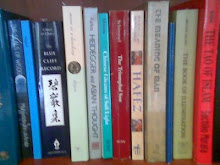So, insha’Allah, the task as a writer or poet is to always put oneself in the midst of what may come, wherever Allah’s manifestation may be happening. Of course, it is happening everywhere, whether we are aware of it nor not, but we want to be in a state of dhikr to recognize it as often and as deeply as possible. This requires a certain training, which, for me, came partly from the time I spent with the muqaddem and shaykh, as well as my earlier Zen Buddhist meditation, and something I became more aware of as I traveled in other parts of the world, and saw what Allah has done with other civilizations, present and past, as Allah ta’ala counsels in the Qur’an.
In the late 1970s, six of us western Sufi Muslims, fuqara of Shaykh ibn al-Habib, traveled throughout northern and south-eastern Algeria in the late 70s, when it was still easier to travel there, and met many awliyya, some wellknown and some more hidden. Every moment you sit with a wali is worth many years of ‘ibada, as it is said, because these men and women of Allah, who have reached a high station with Allah, show us more than words can tell what the grace of Allah and the Prophet, peace be upon him, really is, and how they manifest among us in our present life.
We also spent time living and traveling in Morocco, and attended many mawlids and moussems. In the tomb of Ali al-Jamal in Fez we discovered the book that was translated and published by The Diwan Press as The Meaning of Man. We were told his fuqara, even today, are still coming down to his tomb, which is situated in a low place in Fez, to read from and study his book. We photographed each hand-written page and later transcribed it and translated it into
English, a first-time event of great importance. We also journeyed to Shaykh Ibn Mashish’s mountaintop tomb in Larache, raheemullah, and did dhikr and prayer among the wild cork trees, prostrating in sajdah on the flat cork-floored crest above the canyons as if flying among clouds.
In a way of nourishing the heart and soul, all of these experiences have invested my poetry in a way that I really can’t even explain, and it may not be obviously evident. To this date, I have not written an account about the trip to Shaykh ibn al-Mashish’s tomb, because I’m not a scholar-historian nor memoirist, but a writer of poems. If you remain an open field, from the creative, poetic point of view, Allah works through you however He wills.
Back in the beginning when I was first a Muslim, the poets that I knew and loved, in San Francisco and California at that time, were mostly Buddhist, and they wrote poetry out of their Buddhism, both philosophically and through their love and interest in nature and our natural “enlightened” consciousness. Their poetry is often meditative, recognizing the essence of stillness, and above all, recognizing the goal of the end of mankind’s suffering, which is spiritual wisdom.
At the time, when I thought about my poetic intentions, I said to myself, “This is what I want to do, insha’Allah, for Islam, for Sufism, I want to be a voice that isn’t specifically only speaking to Muslims,” because this time in our history is the era of the Prophet Muhammad, salallahu alayhi wa salam, where Islam is the deen of Allah. We “Muslims” in particular have to remember that the Prophet came for every human being, and it will be so until the end of time — we must speak to everyone. At the inception of my being Muslim and Sufi, I wanted to create a body of work that reminds people, and myself, about Allah, praying and hoping that every poem I write is a dhikr for me, and insha’Allah, also a dhikr for other people. Because as Allah says in Qur’an, “When you forget, remember!” which is an ayat of tremendous mercy. When we go through a moment of unconsciousness, or torpor, ghafla (forgetfulness), then we turn and remember, we remember Allah and His beloved Prophet, salallahu alayhi wa salam, we remember who we are and the path of life we are on, and the heart ticks back into a wider consciousness.
Nik Aziz Dalam Kenangan
10 years ago

